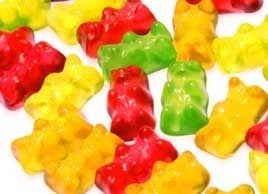5 foods that will destroy your teeth
Certain foods are especially bad for your teeth, and the list might surprise you. Help keep your teeth healthy by avoiding these five foods

For children, trips to the dentist are scary, mostly because it’s unknown territory. They can still be scary for adults, only now it’s because we know what to expect’and how much it’s going to cost. So keeping our teeth clean and healthy is high on the priority list, which is why we’ve compiled this list of foods to avoid if you want to keep those dental visits to a minimum.
But first, a quick lesson on the basic science from Toronto-based dentist Walter Vogl. Sugar, he explains, is the big culprit when it comes to tooth decay. ‘Bacteria that normally exist in our mouth convert these sugars into acid," he says. "As soon as your saliva is acidic, it dissolves calcium from your enamel, a process called demineralization. If this process continues. you eventually lose enough tooth structure to develop a hole in your tooth.’
The saving grace is our saliva, which helps to neutralize acid and is full of calcium and phosphates. After your saliva has done its job, the calcium gets reabsorbed into your enamel, a process called remineralisation.
It’s a balancing act between the two processes every day. However, cautions Dr. Vogl, ‘if the frequency or the duration of acidity increases, then you exceed your saliva’s ability to neutralize acid.’ This can cause you to lose more calcium from your teeth than you get back, which is what causes cavities. Here are five foods that can tip the scale in a very negative way.
1. Hard candy
A post-meal mint may seem like a smart choice, especially if you indulged in the Caesar salad at lunch, but Dr. Vogl says you could be doing more harm than good. ‘Mints, cough drops or hard candies that you suck on have a demineralization effect," he says, "because usually the lozenge ends up sitting in one area for longer periods of time and you get a very concentrated build-up of acid.’ But don’t think you’re doomed to have bad breath. ‘If you use lozenges of any kind on a regular basis," Dr. Vogl suggests, "you should consider getting sugar-free versions.’
2. Sticky candy or fruit
Whether it’s gummy bears, bits of chewy toffee or even chocolate, we all know that indulging this particular craving can leave our teeth feeling less than spectacular. ‘Whenever you have something stuck to your tooth," says Dr. Vogl, "your saliva cannot contact that part of your tooth to neutralize the acid or remineralize the area, so you have a greater loss of calcium.’ Unfortunately this is true even of sticky things that are good for you, such as dried fruit. ‘Bacteria converts all sugars to acid, so it doesn’t matter if it’s refined sugar or fruit sugars.’ If you’re compelled to eat something from this category, follow it up by brushing your teeth.
3. Sports drinks
Dr. Vogl also recommends avoiding viscous, sweet liquids, such as high-carb sports replenishment drinks. Not only are they acidic to begin with, but the thick liquid can stick to your teeth for long periods of time. When it comes to your teeth, it’s best to refuel with plain old H2O.
4. Citrus fruit
If you prefer sour to sweet, you could still be in danger of ruining your teeth. ‘Lemons are quite acidic, so if you suck on them and chew on them for longer periods of time, you are demineralizing your enamel right away,’ Dr. Vogl says. That’s right, not only does the sugar in the lemons (or any sugar added to them) turn acidic in your mouth, they’re acidic’and harm your teeth’to begin with. This goes for other citrus fruits, like oranges and grapefruit, as well.
5. Sodas and fruit juices
Once again, sugar is the bad guy when it comes to these sweet beverages. But don’t stress out too much over them. ‘Unless you’re keeping the soda in your mouth for extended periods of time, or have the habit of swishing the soda around your teeth before swallowing, the demineralization effect can be minimized by drinking some water right after,’ says Dr. Vogl. In addition, keep a stash of straws on hand at all times, to keep the liquid away from your teeth as much as possible.
Don’t miss out! Sign up for our free weekly newsletters and get nutritious recipes, healthy weight-loss tips, easy ways to stay in shape and all the health news you need, delivered straight to your inbox.




